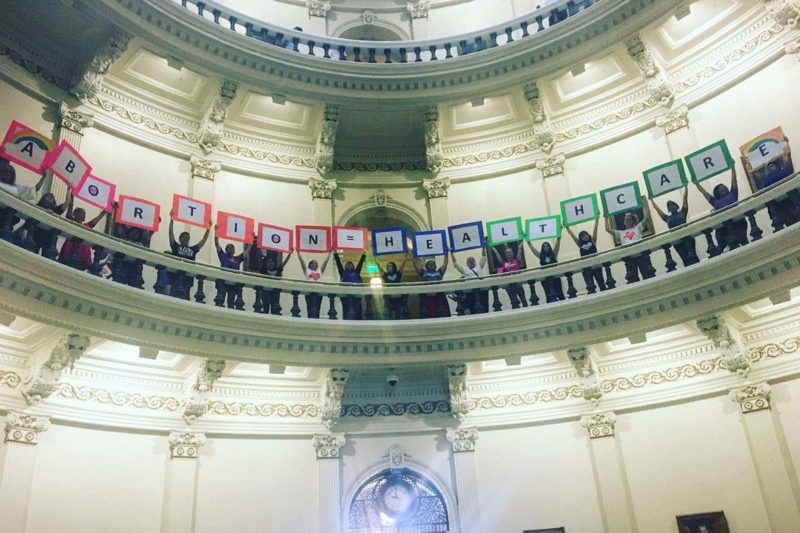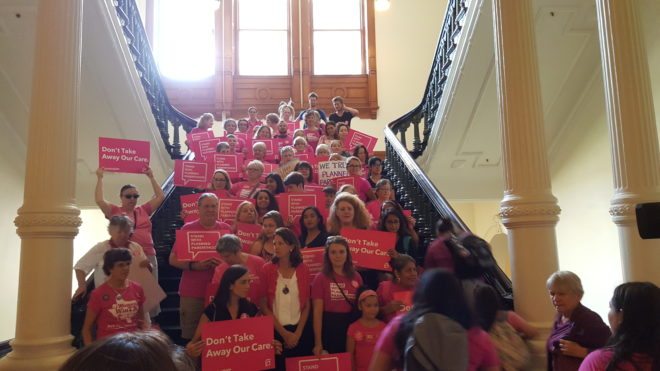‘Beyond Movement Silos’: How Texas Advocates Are Showing Up for Those in Legislature’s Crosshairs
"You would think that activists would just be exhausted and giving up, but not only are they getting louder, they're banding together and making their voices heard at every turn."

The halls of the Texas State Capitol are no strangers to protests, but for organizers witnessing a resurgence of grassroots advocacy and activism, it’s a heartening sign after a series of discouraging years.
Thousands joined the 2013 “people’s filibuster” against HB 2, the omnibus anti-choice bill that eventually made its way to the U.S. Supreme Court, but then momentum faltered with the defeat of Wendy Davis (and other Democratic candidates) in the 2014 election, followed by more setbacks in the intervening years of elections and Republican-led legislative sessions.
After the 2017 legislative session, Texas Republicans ensured that crucial funding bills remained unpassed, forcing lawmakers to return for a special session that costs taxpayers thousands of dollars per day. The Republicans hope to use this opportunity to build on new restrictions on abortion and a “Show Us Your Papers” anti-immigrants’ rights law, both subject to ongoing lawsuits, while forcing through unpopular and discriminatory legislation that failed to pass during the regular term.
In addition to new attacks on reproductive health care, bills under consideration in the special session include a refurbished version of North Carolina’s infamous anti-transgender bathroom bill, attacks on the ability of unions to collect dues from public workers, and even new restrictions on cities’ ability to protect historic trees from destruction.
Though fueled by leaders in the reproductive rights and justice movements, the resistance to the special session is diverse, drawing together activists around issues that aren’t always seen as connected. Leading the way is One Texas Resistance, a coalition made up of about three dozen groups, including nonprofits like the American Civil Liberties Union (ACLU) of Texas, regional organizations like the Afiya Center and United We Dream Houston, and local representatives of people-powered movements like Indivisible.
Hundreds of supporters of the coalition gathered on July 18, the opening day of the session, despite sweltering temperatures, to send a powerful message of opposition. They’ve returned by the dozens on numerous days since to advocate for their rights.

“People are certainly paying attention,” said Yvonne Gutierrez, the executive director of Planned Parenthood Texas Votes. “You would think that activists would just be exhausted and giving up, but not only are they getting louder, they’re banding together and making their voices heard at every turn.”
“We Are All in the Same Struggle for Liberation”: Building Ties Between Movements in Texas
The current coalition expands on years of work, including the Trust. Respect. Access. coalition, a collaboration between Planned Parenthood, NARAL Pro-Choice Texas, regional state abortion funds, and groups like the ACLU of Texas. The special session provided an opportunity to expand the scope of that work further to include LGBTQ+ rights groups like Equality Texas and labor rights groups like Workers Defense Action Fund.
Gutierrez said the ties between the various issues under attack by Gov. Greg Abbott’s “extremist agenda” are especially clear at the clinic level. “We provide trans care. We provide care to undocumented women, men, and teens and so all of these issues really affect Planned Parenthood patients and it is really similar among many of the organizations,” she said. “The people who are being affected by these issues live intersectional lives.”
“Something that I’ve seen happen more and more and with more momentum in recent months is this impulse to organize beyond movement silos because we are all in the same struggle for liberation,” agreed Hannah Thalenberg, the Houston field organizer for NARAL Pro-Choice Texas.
With the help of All* Above All, Thalenberg and representatives of Texas abortion funds gathered their supporters and coalition members at the Texas capitol on two consecutive days of lobbying, beginning on July 27. A major focus was fighting a proposal to ban private insurance companies from covering abortion, which eventually passed both the house and senate.
On the first day, activists lined up in the rotunda of the capitol holding signs outlining the numerous restrictions on abortion access passed in recent decades, while abortion fund staff shared the stories of patients’ suffering under these laws. At a signal, everyone began chanting and the signs were flipped over, now spelling out the words of their chant: “Abortion = health care!”
During a special session, bills move quickly, often in the middle of the night, and rules around public hearings and other aspects of legislative procedure are sometimes suspended. With a greater number of people equipped to share information, Thalenberg told Rewire that the coalition helps her keep people in her city informed and active even when they can’t travel to the capitol. She recently organized a remote “mock committee hearing” on abortion access, gathering testimony from Houstonians that can later be used by sympathetic legislators.
Nan Little Kirkpatrick, executive director of Texas Equal Access (TEA) Fund, an abortion fund serving northern Texas, also praised the work of the coalition during the special session.
“It’s given us an opportunity as abortion funds to show up for the immigration fight, to show up for workers’ rights in the state, and to show up for trans people in a really meaningful way,” Little Kirkpatrick said. “And it’s opened up the abortion access fight to a new audience of people who’ve been really supportive.”
“It’s always important to have intersectional work, but right now what we’re seeing is we’re all kind of being lumped together by our elected officials,” said Lou Weaver, transgender programs coordinator at Equality Texas, when asked him about the coalition. “If one isn’t equal, none of us is equal.”
Robert Salcido, Equality Texas’ statewide field coordinator, told Rewire that the One Texas Resistance coalition, and similar groups working during the regular session, had helped prevent discriminatory legislation from passing. “Seeing so many people in a coalition to advance fairness and equality has really been instrumental in stopping many of the anti-LGBTQ bills that we’ve seen.”
Like Thalenberg, Salcido also suggested the coalition has helped activists escape movement “silos” to work better together.
“As an LGBTQ person … we are part of every community and it only makes sense that we’re able to advocate not only for our LGBTQ identities but also advocate for our other identities, whether it’s immigration, reproductive health, racial justice, access to health care,” Salcido said.
Beyond the Legislature, Coalition Members Build Local Support for Justice
Infighting between the Texas house and senate, and unpopular proposals like restrictions on transgender rights (a move opposed even by some in the oil and gas industry), offer activists some leverage. The coalition may find temporary allies in unexpected places if Republican house members think it will score them points in their feud with the senate. Still, their hopes of blocking most of these bills remain slim. That’s why organizers are looking beyond the special session to build lasting support for all of the causes backed by One Texas Resistance.
“TEA Fund, particularly in Dallas/Fort Worth has really strived to create cross-movement coalitions around abortion access, and to be active in the anti-police brutality work in our community and the immigration work in our community.” Kirkpatrick told Rewire. “We know it’s a long-term battle but we need to all be working on the ground to work on people’s attitudes.”
NARAL Pro-Choice Texas, the abortion funds, and their allies, are introducing legislation at the local level to improve abortion access, health-care coverage, and all the rights under the very broad umbrella of reproductive justice. Created by women of color in 1994, the reproductive justice framework underscores the importance of the right to parent, not to parent, and to parent in a safe and healthy environment. Since Texas Republicans are undermining local control with many of their bills, NARAL Pro-Choice Texas wants to create a cultural shift that leads to these kinds of attacks on human rights becoming untenable.
“If we don’t have that grassroots community support, I don’t think any movement for change can be sustainable,” Thalenberg told us.
With about a week left to force Abbott’s agenda through a sometimes recalcitrant house of representatives, the pace of Texas politics is going to be dizzying. The activists of One Texas Resistance, however, aren’t going to let these laws pass quietly. As Planned Parenthood’s Yvonne Gutierrez told Rewire, “Elected officials are certainly on notice and their behavior is not going unnoticed.”
